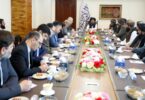KABUL (Khaama Press): Afghan Journalists Safety Committee in Afghanistan on Thursday announced that it has recorded 132 threats and violence as opposed to journalists.
Report analysis indicates a 26 percent increase than 2019, seven journalists and media workers were killed, five killed as a result of targeted killings and IED attacks.
This report hints at a worrying status of journalists’ safety and media freedom in Afghanistan.
The rise in killings of the journalists has created “extensive fear” among media” outlets, it has reduced content production capabilities, and expanded self-censorship, the committee said.
The escalation of attacks on journalists at the end of 2020 spread panic between journalists and media outlets across the country, such attacks had noticeable adverse effects on reporting procedures, many journalists reconsider how and whether to report a certain topic for fear of reprisal, that paved the path for wide practice of self-censorship, according to the AJSC statement.
Besides, the pandemic has created financial challenges for media outlets which kept then the frustration of raising funds for creating media content.
The statement said, media and civil society groups are concerned, as the republic’s delegation lacks a coherent strategy to preserve key constitutional rights including freedom of speech and media.
“The Taliban’s ideological opposition to these values enhances concerns about the future of such freedoms. Further, the government’s efforts in early 2020 to draft a new Media Law, which could extensively limit press freedom if enacted, and the lack of meaningful commitment to investigate the cases of murdered journalists have fueled these concerns,” the statement read.
AJSC recorded 132 threats and violence against Afghan journalists and media workers, this includes their murder, injuries, assault, kidnappings, threat, theft, legal, verbal and administrative abuse.
The data in 2020 shows a 26 percent increase in threats and violence against reporters compared to 2019 in which the organization had recorded only 105 cases.
18 journalists were injured while reporting, 10 were physically assaulted, 47 threatened, 28 verbally abused, 13 journalists and media workers faced legal and administrative abuse, 7 journalists were kidnapped and two were victims of theft while on the field working on reports.
AJSC held the Taliban and Daesh accountable for majority of the violence and threats and the government officials come second, AJSC stated.
Historically Afghanistan has reached a critical juncture, although the recent peace process formed hopes to an ending and prolonged peace, and reduction in violence.
Despite efforts for peace violence raged and surged, and many journalists, civil society activists were killed, which raised serious concerns over peace talk success and whether core values of freedom of expression, speech and civil liberties be protected, the statement added.
This comes as NATO Secretary-General Jens Stoltenberg in a joint press conference said “we have seen attacks … against individuals, journalists, and others, and of course the high level of violence is something which is of great concern.”
Jens Stoltenberg said, “so, we will make the assessment together, we will make the decision together, and this will be one of the most important topics that will be discussed when we have a NATO Defense Ministerial meeting later this month and decisions will be made,”
He said that NATO and its allies came by a difficult decision on Afghanistan and that they should make the decision together, because the international leaders will face challenges and costs, on whatever they decide.
“If we decide to leave, we risk jeopardizing the peace process, we risk losing the gains we have made in the fight against international terrorism over the last years, and we risk that Afghanistan once again becomes a safe haven for international terrorists,” he said.
“On the other hand, if we decide to stay, of course we will continue to be in a difficult military operation in Afghanistan, and we risk increased violence also against NATO troops,” he added that the Taliban “have to live up to their commitments, especially when it comes to breaking old ties with international terrorists including Al Qaeda. And we need to see reduced violence.”
Belgium PM, Alexander De Croo during the press conference said, “To really align with what the secretary general said, on the Belgium side we are committed to this NATO mission, and the word ‘together’-you mentioned it multiple times- I think that’s the key. We made the decision together to intervene.” “If we adjust, well, we should decide together to adjust, at some point, we will leave Afghanistan,” he mentioned.






